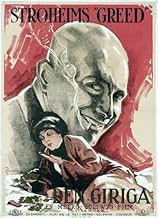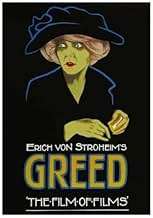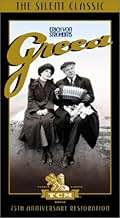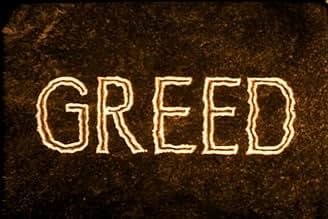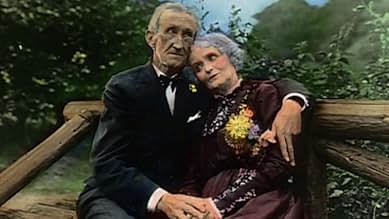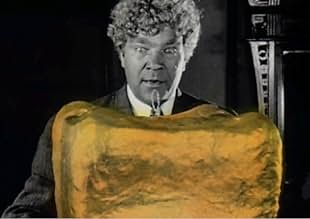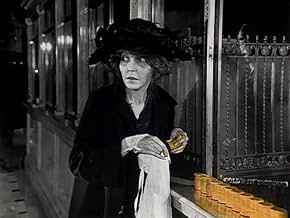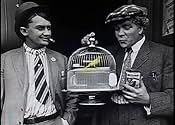ÉVALUATION IMDb
8,0/10
11 k
MA NOTE
Ajouter une intrigue dans votre langueThe sudden fortune won from a lottery fans such destructive greed that it ruins the lives of the three people involved.The sudden fortune won from a lottery fans such destructive greed that it ruins the lives of the three people involved.The sudden fortune won from a lottery fans such destructive greed that it ruins the lives of the three people involved.
- Prix
- 3 victoires au total
Sylvia Ashton
- 'Mommer' Sieppe
- (as Silvia Ashton)
William Barlow
- The Minister
- (uncredited)
Lita Chevrier
- Extra
- (uncredited)
Jack Curtis
- McTeague Sr.
- (uncredited)
Gwendolynne D'Amour
- Undetermined Secondary Role
- (uncredited)
James F. Fulton
- Cribbens - Prospector
- (uncredited)
Edward Gaffney
- Extra
- (uncredited)
Florence Gibson
- Hag
- (uncredited)
James Gibson
- Deputy
- (uncredited)
Oscar Gottell
- Sieppe Twin
- (uncredited)
Otto Gottell
- Sieppe Twin
- (uncredited)
Avis en vedette
There was a time, and it was only a few years ago, when I found it difficult to sit through a silent film. The exaggerated movements and facial expressions and the over-bearing music, I believe, turned me off.
However, that changed drastically when I watched von Stroheim's Greed for the first time. The film, simply put, is immaculate. The portrayal of McTeague and Trina is fantastic. Pitts and Gowland, without using their voices mind you, create depth and allow the audience to sympathize with the characters. Silence often acted as a barrier between myself and the characters; here, that distance is bridged by the two actors and, I must assume, von Stroheim's masterful direction.
Yes, the direction is masterful. I believe describing it as such is entirely accurate. Innovative may go too far, but masterful just about covers it. The realism (which shooting on locations benefited) is something to behold. This is a story that Hollywood would balk at depicting in 2004; imagine the row that was had in 1924. Von Stroheim never backs away from his unrelentingly grim vision, reinforcing his theme (money is evil) throughout. And then there is the Death Valley sequence - one of the most marvelous series of scenes committed to celluloid.
All in all, this is truly a fantastic film - one that has aged, due to its ability to treat grim subject matter as it should, much better than many of its contemporaries. Also, it should be noted, that this represents a fine adaptation of Norris' novel McTeague. I was a fan of the novel before I saw the film and the film does not disappoint.
Von Stroheim ensured that the spirit, if not the word, of the novel was maintained.
10/10
However, that changed drastically when I watched von Stroheim's Greed for the first time. The film, simply put, is immaculate. The portrayal of McTeague and Trina is fantastic. Pitts and Gowland, without using their voices mind you, create depth and allow the audience to sympathize with the characters. Silence often acted as a barrier between myself and the characters; here, that distance is bridged by the two actors and, I must assume, von Stroheim's masterful direction.
Yes, the direction is masterful. I believe describing it as such is entirely accurate. Innovative may go too far, but masterful just about covers it. The realism (which shooting on locations benefited) is something to behold. This is a story that Hollywood would balk at depicting in 2004; imagine the row that was had in 1924. Von Stroheim never backs away from his unrelentingly grim vision, reinforcing his theme (money is evil) throughout. And then there is the Death Valley sequence - one of the most marvelous series of scenes committed to celluloid.
All in all, this is truly a fantastic film - one that has aged, due to its ability to treat grim subject matter as it should, much better than many of its contemporaries. Also, it should be noted, that this represents a fine adaptation of Norris' novel McTeague. I was a fan of the novel before I saw the film and the film does not disappoint.
Von Stroheim ensured that the spirit, if not the word, of the novel was maintained.
10/10
A film almost as powerful as it is famous, Greed is pretty straight-forward about its theme: Greed. And what it does to people.
This would not be a silent film known for its subtlety, but a large part of that is the fact that it's really only a tenth of the film it was supposed to be. Entire reels have been cut down to single cue-cards, entire years jump by that were obviously supposed to be shown. In terms of the general "rules" of narrative, it works out well enough that it's still a quite clear story that follows a reasonable pace, but the lack of a lot of the character development and the like is pretty apparent.
Still, the music used on the film and the general story itself is powerful enough, it's definitely worth your time.
A man and a woman marry. The man is a simpleton, the woman is a hoarder. When she wins a $5000 lottery, she vows never to spend a cent of it... something that sets her husband and their common friend at odds as they all want the cash... but not necessarily to spend it. Entire relationships and lives are ripped asunder as they all grapple for their rights to "their" property: their greed.
This movie has been praised for its realism, but that couldn't be further from the truth. This movie is romanticized to the level of absurdity, the characters are so full-blown they are often hard to relate to. This comes from the fact that 80% of their development has been lost in the final cut. I don't want this to seem like a bad thing: because of their incredible antics, the movie takes you to places almost entirely unheard of and definitely unexpected.
It's one deep thrill after the other, backed up by some very beautiful imagery and intense music. It's just unfortunately not what the director intended. Even back in the day, people just didn't have a big enough attention span, and I find that very tragic. I want to see the ten-hour version.
--PolarisDiB
This would not be a silent film known for its subtlety, but a large part of that is the fact that it's really only a tenth of the film it was supposed to be. Entire reels have been cut down to single cue-cards, entire years jump by that were obviously supposed to be shown. In terms of the general "rules" of narrative, it works out well enough that it's still a quite clear story that follows a reasonable pace, but the lack of a lot of the character development and the like is pretty apparent.
Still, the music used on the film and the general story itself is powerful enough, it's definitely worth your time.
A man and a woman marry. The man is a simpleton, the woman is a hoarder. When she wins a $5000 lottery, she vows never to spend a cent of it... something that sets her husband and their common friend at odds as they all want the cash... but not necessarily to spend it. Entire relationships and lives are ripped asunder as they all grapple for their rights to "their" property: their greed.
This movie has been praised for its realism, but that couldn't be further from the truth. This movie is romanticized to the level of absurdity, the characters are so full-blown they are often hard to relate to. This comes from the fact that 80% of their development has been lost in the final cut. I don't want this to seem like a bad thing: because of their incredible antics, the movie takes you to places almost entirely unheard of and definitely unexpected.
It's one deep thrill after the other, backed up by some very beautiful imagery and intense music. It's just unfortunately not what the director intended. Even back in the day, people just didn't have a big enough attention span, and I find that very tragic. I want to see the ten-hour version.
--PolarisDiB
10funkyfry
Heavily edited MGM release version of Stroheim's 8 hour epic satisfies at 2 and a half hours -- you have to wonder if any extra length would have made it a little better or a little worse. To be sure, Stroheim probably ran the thing pretty slow when he projected it. Authentic detail in locations adds another level of interest, as we get to see parts of San Francisco, Oakland, and Placer County in the early 20s. The story is dark and involved, detailing the love of two people destroyed by their compulsive greed and neuroses. There is no moment in its story where the viewpoint is not pessimistic, except the image of dual humanity presented in McTeague's birds. Exceptional.
Erich von Stroheim made his film version of Frank Norris' novel McTeague', and, as is well-known, it lasted over eight hours. The version which has survived is obviously nothing near that length, and cuts out many of the subplots from the book which had been planned and filmed.
What has survived is a broken masterpiece, starring Gibson Gowland, ZaSu Pitts, and Jean Hersholt, which is full of memorable images (not just the final sequences in the desert, but the trip out where McTeague and Trina fall awkwardly in love, and the scene where Trina rolls literally in the golden coins strewn on her bed) and makes you long for more of this film to turn up from the vaults.
There is a marvellous book available which reconstructs much of the lost material through stills, and much of this was amalgamated with the existing footage to restore' the film during the late 1990s. Even in its butchered state, Greed is well worth a look.
What has survived is a broken masterpiece, starring Gibson Gowland, ZaSu Pitts, and Jean Hersholt, which is full of memorable images (not just the final sequences in the desert, but the trip out where McTeague and Trina fall awkwardly in love, and the scene where Trina rolls literally in the golden coins strewn on her bed) and makes you long for more of this film to turn up from the vaults.
There is a marvellous book available which reconstructs much of the lost material through stills, and much of this was amalgamated with the existing footage to restore' the film during the late 1990s. Even in its butchered state, Greed is well worth a look.
I saw the Turner Classic Movies version of this with the still pictures implanted in missing scenes. Although a certain flow is lost, it comes across as a great film. What a shame that so much was destroyed. It tells the story of two pretty good people who should never have got together. Zasu Pitts who looks pretty glamorous at first, is obsessed with money. This obsession ends up destroying her life and McTeagues. There are scenes that are just uncomfortable and others that are horrible. The jockeying for position in the family with the husband willing to bend only so far leads to tragic consequences. Avarice will eventually take one down and Von Stroheim showed this to us. The scene with the two men fighting it out in the desert at the end is one of the most painful ever. Neither can ever hope to survive, yet their fixation on gold goes beyond their love of life. It is so pathetic. Even with all that missing footage, everyone should see this for the masterful presentation of the sick and dying characters. Deep down inside, I've always hoped that someone will open a vault or a supply cabinet, and there will be the rest of Von Stroheim's masterpiece. We can only hope, can't we.
Le saviez-vous
- AnecdotesWhile filming the final confrontation in the desert, Erich von Stroheim allegedly shouted several times at actors Gibson Gowland and Jean Hersholt "Hate each other! Hate each other as much as you hate me!"
- GaffesAfter Marcus breaks McTeague's pipe and throws a knife at him, men pull McTeague's tie off as they hold him back. The tie is back in place a moment later as McTeague rushes out of the saloon.
- Citations
Title card: GOLD - GOLD - GOLD - GOLD. Bright and Yellow, Hard and Cold, Molten, Graven, Hammered, Rolled, Hard to Get and Light to Hold; Stolen, Borrowed, Squandered - Doled.
- Générique farfeluThe film begins with the "Metro-Goldwyn" logo, and "presented" by Louis B. Mayer. Later the opening credits read "Produced by Metro-Goldwyn-Mayer Corporation Released through Metro-Goldwyn Distributing Corporation". The following year, 1925, Metro-Goldwyn and Louis B. Mayer would merge into Metro-Goldwyn-Mayer.
- Autres versionsVersion 5, 16 reels (4,800 meters), edited by June Mathis - According to Jean Mitry who saw it in Paris ("Le romantisme de Stroheim", article in L'Avant-Scène du Cinéma, no. 83-84, July 1968), this version had exactly 4 hours running time. It cut off all derivative stories about supporting characters, concentrating the story on the character McTeague, and adding a number of inter-titles to explain what happened in the deleted scenes. This version was shown in the theatre Studio des Ursulines, Paris, and then the French distributor cut it to a 2 hour film. Cinémathèque Française has a copy of the Mathis' cut - but versions 1 to 4 of the film are considered lost films (1999).
- ConnexionsEdited into Histoire(s) du cinéma: Une histoire seule (1989)
Meilleurs choix
Connectez-vous pour évaluer et surveiller les recommandations personnalisées
- How long is Greed?Propulsé par Alexa
Détails
- Date de sortie
- Pays d’origine
- Langues
- Aussi connu sous le nom de
- Greedy Wives
- Lieux de tournage
- 611 Laguna Street, San Francisco, Californie, États-Unis(McTeague's Dental Office)
- société de production
- Consultez plus de crédits d'entreprise sur IMDbPro
Box-office
- Budget
- 546 883 $ US (estimation)
- Durée2 heures 20 minutes
- Couleur
- Mixage
- Rapport de forme
- 1.33 : 1
Contribuer à cette page
Suggérer une modification ou ajouter du contenu manquant


![Regarder Trailer [OV]](https://m.media-amazon.com/images/M/MV5BMDgyZjg5NWUtZDM1Yi00YjE3LWIyNTQtMjIxNzQ0ZmE2ZGE1XkEyXkFqcGdeQXRyYW5zY29kZS13b3JrZmxvdw@@._V1_QL75_UX500_CR0)

